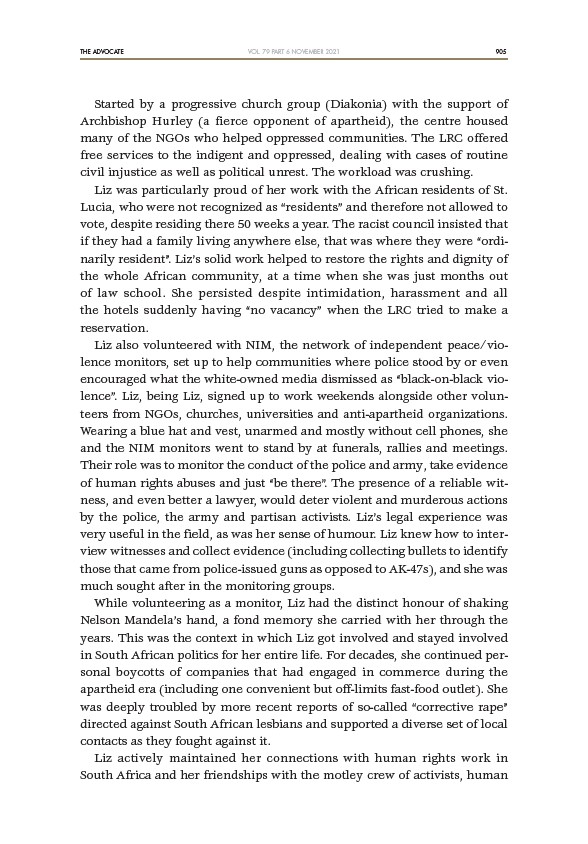
THE ADVOCATE 905
VOL. 79 PART 6 NOVEMBER 2021
Started by a progressive church group (Diakonia) with the support of
Archbishop Hurley (a fierce opponent of apartheid), the centre housed
many of the NGOs who helped oppressed communities. The LRC offered
free services to the indigent and oppressed, dealing with cases of routine
civil injustice as well as political unrest. The workload was crushing.
Liz was particularly proud of her work with the African residents of St.
Lucia, who were not recognized as “residents” and therefore not allowed to
vote, despite residing there 50 weeks a year. The racist council insisted that
if they had a family living anywhere else, that was where they were “ordinarily
resident”. Liz’s solid work helped to restore the rights and dignity of
the whole African community, at a time when she was just months out
of law school. She persisted despite intimidation, harassment and all
the hotels suddenly having “no vacancy” when the LRC tried to make a
reservation.
Liz also volunteered with NIM, the network of independent peace/violence
monitors, set up to help communities where police stood by or even
encouraged what the white-owned media dismissed as “black-on-black violence”.
Liz, being Liz, signed up to work weekends alongside other volunteers
from NGOs, churches, universities and anti-apartheid organizations.
Wearing a blue hat and vest, unarmed and mostly without cell phones, she
and the NIM monitors went to stand by at funerals, rallies and meetings.
Their role was to monitor the conduct of the police and army, take evidence
of human rights abuses and just “be there”. The presence of a reliable witness,
and even better a lawyer, would deter violent and murderous actions
by the police, the army and partisan activists. Liz’s legal experience was
very useful in the field, as was her sense of humour. Liz knew how to interview
witnesses and collect evidence (including collecting bullets to identify
those that came from police-issued guns as opposed to AK-47s), and she was
much sought after in the monitoring groups.
While volunteering as a monitor, Liz had the distinct honour of shaking
Nelson Mandela’s hand, a fond memory she carried with her through the
years. This was the context in which Liz got involved and stayed involved
in South African politics for her entire life. For decades, she continued personal
boycotts of companies that had engaged in commerce during the
apartheid era (including one convenient but off-limits fast-food outlet). She
was deeply troubled by more recent reports of so-called “corrective rape”
directed against South African lesbians and supported a diverse set of local
contacts as they fought against it.
Liz actively maintained her connections with human rights work in
South Africa and her friendships with the motley crew of activists, human